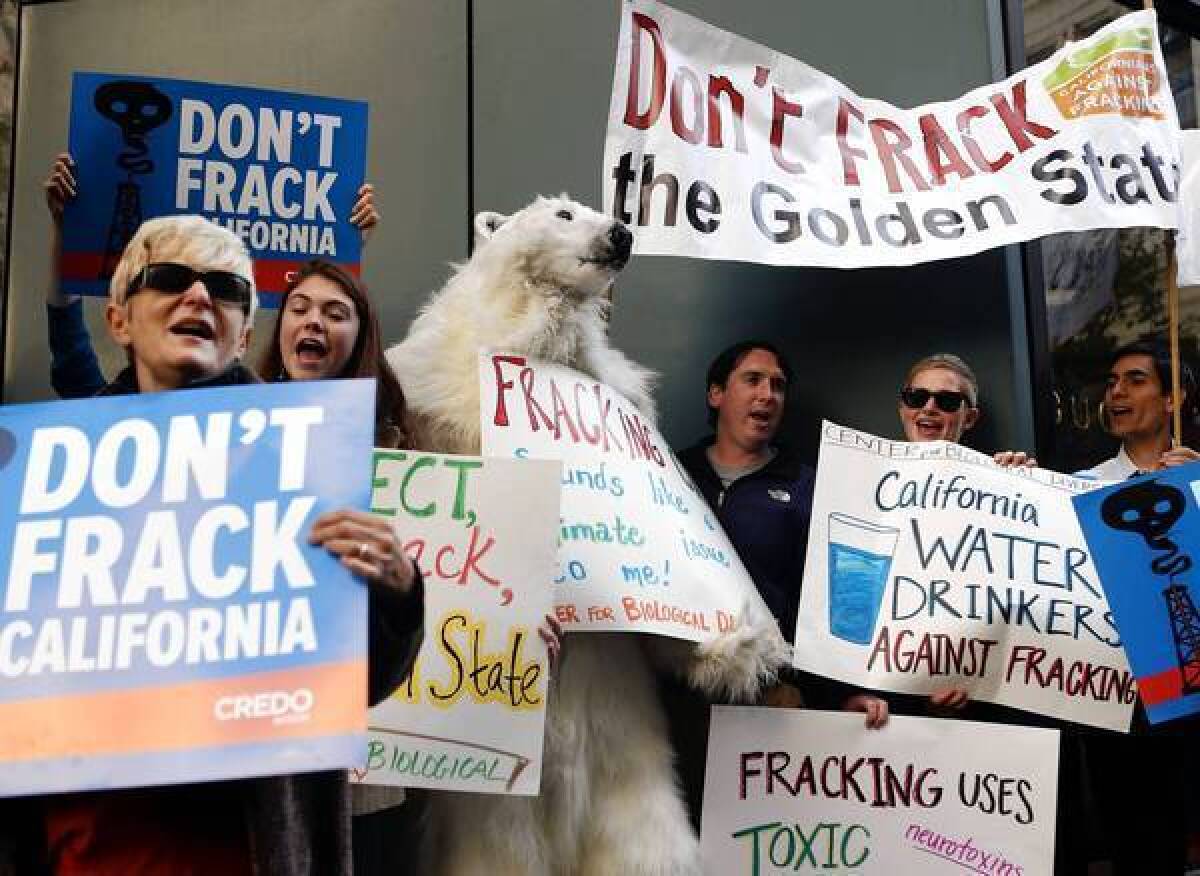Brown signs bill on fracking, upsetting both sides of oil issue

- Share via
SACRAMENTO — The nation’s toughest restrictions on a controversial oil drilling technique known as fracking were signed into law by Gov. Jerry Brown on Friday.
Hotly opposed by the oil industry, the measure “establishes strong environmental protections and transparency requirements,” the governor said in a statement.
Brown also signed measures giving law enforcement officers clear authority to take blood samples from resistant suspected drunk drivers; making it easier for police to recover stolen goods; and setting rules for California’s health insurance exchange.
At issue in the hydraulic fracturing measure is the injection of sand, water and chemicals to free oil and natural gas trapped in shale deep underground. The oil industry heralds the technique as a way to boost domestic oil and gas production; opponents contend it is unsafe and endangers underground drinking-water supplies.
The governor’s signature “is a first step toward greater transparency, accountability and protection of the public and the environment,” said Sen. Fran Pavley (D-Agoura Hills).
Her bill, SB 4, is the sole survivor of a half-dozen fracking proposals in the Legislature this year. It requires permitting of wells, notification of neighbors living near drilling, groundwater testing and a study of fracking’s impact on the environment. It takes effect Jan. 1, 2014.
The bill also would set rules for a related technique involving the shooting of acid solutions into the wells to release hydrocarbons.
Oil industry reaction was muted. Companies complained that the regulations go further than they thought necessary for safe drilling.
But Catherine Reheis-Boyd, president of the Western States Petroleum Assn., a trade group, welcomed the chance to continue exploring oil-rich areas in the central and southern San Joaquin Valley.
In a statement, she stressed that her members now can move forward with “an environmental platform on which California can look toward the opportunity to responsibly develop the enormous potential energy resource contained in the Monterey Shale formation.”
Most environmental groups wanted a veto. The governor’s action “is disappointing,” said Kathryn Phillips, California director of the Sierra Club. “This bill does not provide the kind of protection or approach to fracking that we need.”
In his signing message, Brown directed the state’s Department of Conservation to develop “an efficient permitting program” to fine-tune the new regulations.
In a related matter, Brown also signed a bill to bolster bonding requirements to make sure that drillers can pay for the cost of repairing environmental damage they might cause.
That bill, SB 665 by Sen. Lois Wolk (D-Davis), “will shift the financial burden of responding to abandoned wells or other violations from taxpayers to oil and gas drillers,” Wolk said.
The measure on blood samples allows search warrants to be issued so law enforcement officers can take the samples as evidence in misdemeanor drunk-driving cases when suspects refuse consent.
The law was requested by Los Angeles County Dist. Atty. Jackie Lacey, after a recent court decision challenged the authority of officers to conduct warrantless searches.
The U.S. Supreme Court ruled in April that police officers usually must have a search warrant before requiring a suspected drunk driver to have blood drawn.
The court rejected the argument of Missouri prosecutors who said law enforcement should have the freedom to act quickly without one because alcohol dissipates in the blood.
Sen. Mark DeSaulnier (D-Concord) wrote the measure, SB 717, to include misdemeanor drunk driving cases on the list of crimes for which search warrants can be issued.
The measure was opposed by California Attorneys for Criminal Justice, which wrote to state officials that it would “lead to a dilution of key constitutional protections against unreasonable searches.”
The governor also signed a consumer-protection measure involving the insurance industry. It requires cancellation notices for auto insurance policies to be mailed at least 20 days before cancellation, or 10 days when cancellation is for nonpayment of a premium.
The Assembly Committee on Insurance introduced the bill, AB 1391.
Brown also approved a measure allowing law enforcement officers who suspect that property in the possession of pawnbrokers or secondhand dealers is lost or stolen to put a 90-day hold on its sale. It also allows the officer to take the property as evidence. Sen. Jerry Hill (D-San Mateo) introduced SB 762.
And the governor put into state law provisions of the federal Affordable Care Act that set caps on out-of-pocket expenses for consumers who buy health coverage through the state insurance exchange. Sen. Ed Hernandez (D-West Covina), is author of SB 639.
More to Read
Sign up for Essential California
The most important California stories and recommendations in your inbox every morning.
You may occasionally receive promotional content from the Los Angeles Times.












